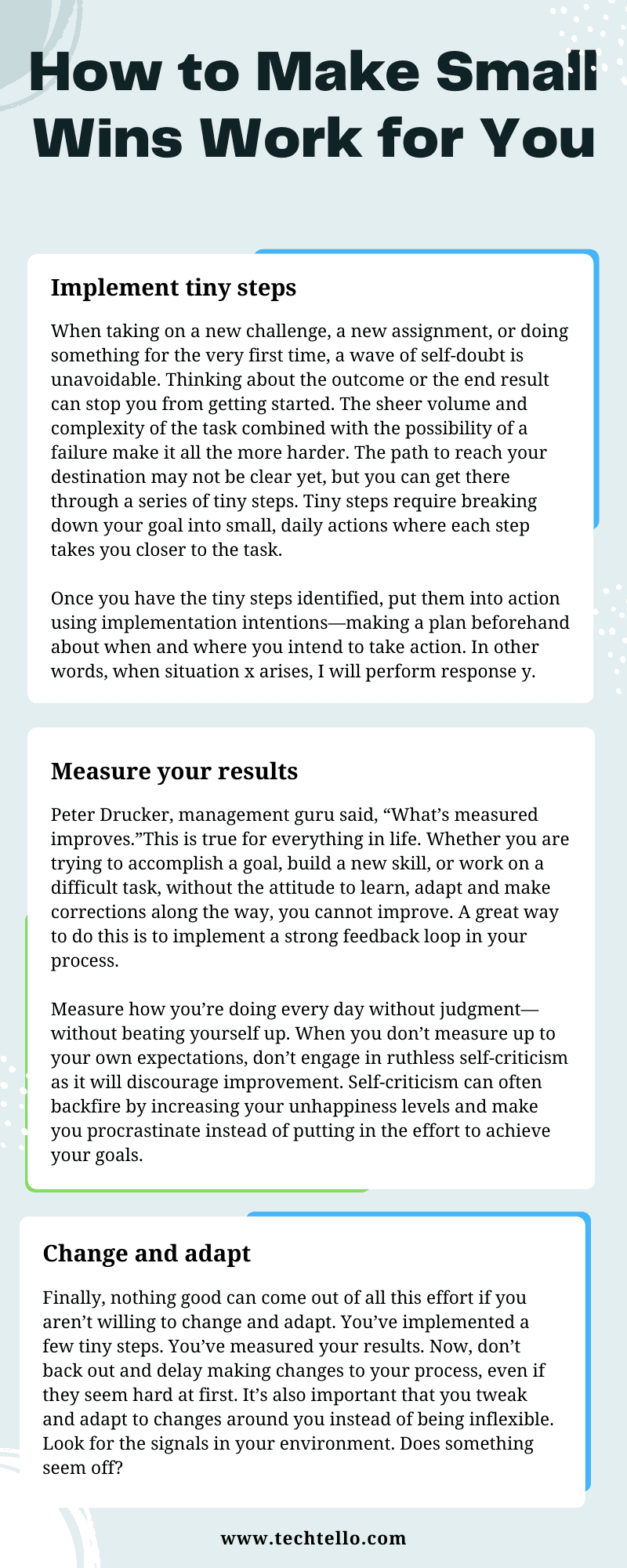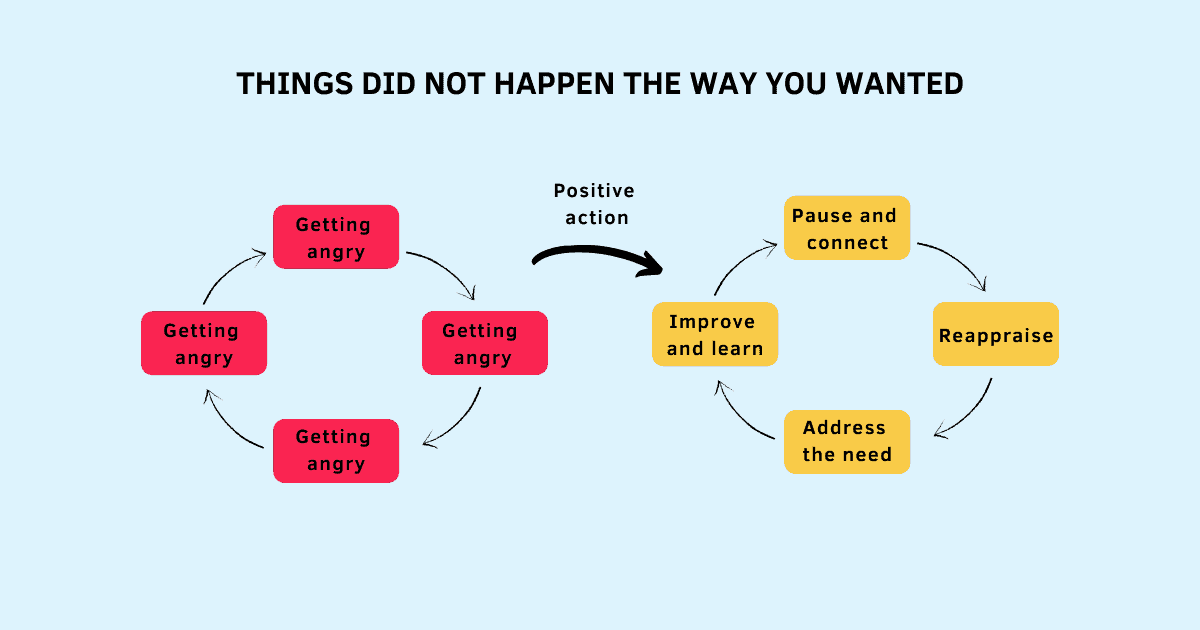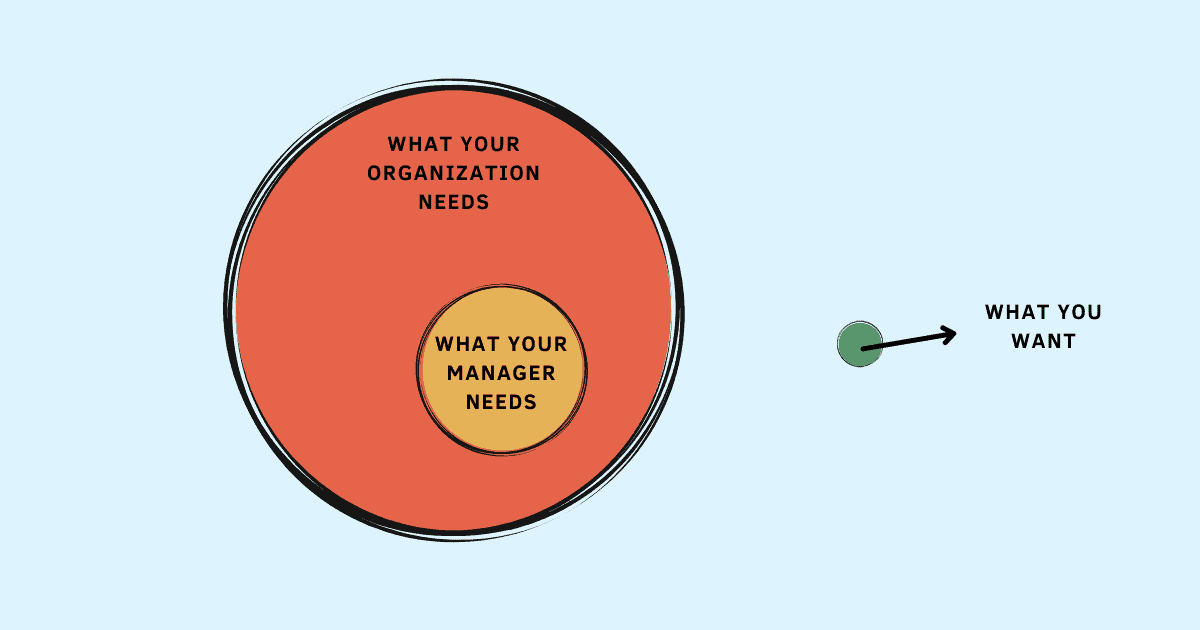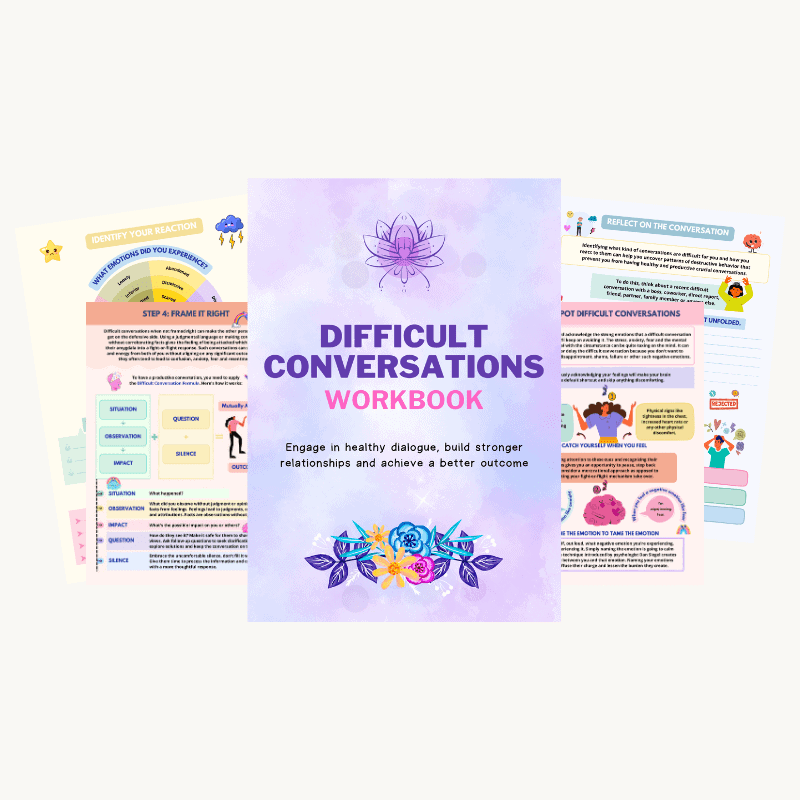Instead of Those Lofty Goals, Go After the Small Wins
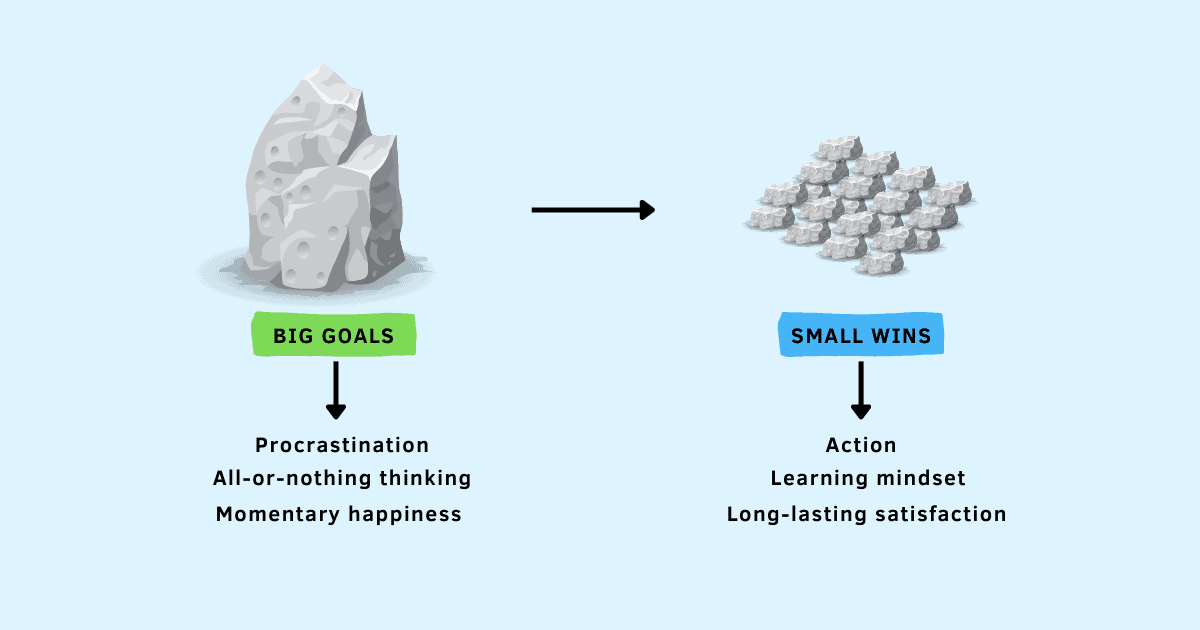
Do you celebrate big victories, audacious goals, and major milestones? You must. We all do.
After all, they feel good, they create a sense of achievement, and they validate your competence. They bring happiness, but for how long? Before you know it, another milestone, another task, another goal gets your attention.
The satisfaction of doing something big vanishes like a puff of smoke. You’re back on the treadmill chasing a bigger goal. Once you’re on the treadmill, what was once a source of pride and joy is no longer special. All the hard work and effort you put into coming this far turns into a routine. It’s no longer exciting. It no longer fulfills you. Every new achievement is just like those previous ones: momentary happiness without long-lasting satisfaction.
What does not last long can’t motivate you to do better. There’s another problem with chasing bigger and greater accomplishments. Getting habituated to major successes leads to black-and-white or all-or-nothing thinking. You either succeed or fail. You’re either good or you’re bad. You’re either competent or inept. There’s nothing in between; no middle ground.
All-or-nothing thinking makes you operate at the extremes. The two words in your dictionary “always” and “never” start to rule your life. It gets hard to see mistakes and failures as one-off events and not a true measure of your worth. Placing everything into boxes of “good” and “bad” leaves no room for balanced perspectives.
Big goals that are far off into the future can also lead to procrastination. You may fear the outcome and keep putting it off to save yourself from the shame and embarrassment of not meeting others’ expectations. But the more you delay, the harder it gets. Approaching deadline further amplifies your fear. The outcome is hardly good as you scramble to get work done at the last minute.
Instead of major victories with outsized expectations, what if you targeted small wins? Small daily goals that give a sense of progress; work that moves you forward, is fulfilling and rewarding, where each step takes you closer to your destination.
Charles Duhigg, author of The Power of Habit describes the power of small wins as “Small wins are exactly what they sound like, and are part of how keystone habits create widespread changes. A huge body of research has shown that small wins have enormous power, an influence disproportionate to the accomplishments of the victories themselves…Once a small win has been accomplished, forces are set in motion that favor another small win. Small wins fuel transformative changes by leveraging tiny advantages into patterns that convince people that bigger achievements are within reach.”
Amazing Goal Planner
Become your best self by setting and achieving goals in all important areas of your life.
What’s a small win?
Karl E. Weick, the organizational theorist and distinguished professor at the University of Michigan defines a small win as “a concrete, complete, implemented outcome of moderate importance.”
For example: Let’s say your manager has asked you to create a new product pitch and submit it in a month.
Task is big. You haven’t done it before. There’s excitement to get an opportunity like this while the fear of not meeting your manager’s expectations makes you anxious. You need task-focused attention, but find it hard to focus. Thinking about the end goal and the magnitude of work ahead of you makes you nervous.
Instead of doing the work, you’re constantly distracted:
My manager will never trust me if I don’t do this well.
My career will be over if the pitch isn’t perfect.
What if I put in my best effort, but the outcome isn’t good enough?
Stakes for not meeting expectations are high. Right when you need to put your best foot forward, all that work ahead of you makes you want to give up. Instead of getting started, you keep putting it off. Waiting for motivation to strike or a day when you won’t be scared makes you lose important days when you could have made progress.
Instead of the lofty goal of preparing a perfect pitch, what if you targeted daily wins? Instead of worrying about all that you need to do to complete the pitch, what if you only considered what needed to be done each day?
In the example above of creating a product pitch, here are some examples of small wins:
- Read the requirements and take notes.
- Give another parse to the requirements and identify anything you might have missed.
- Clarify the objectives and key results expected from the task. Document them and get a written confirmation.
- Do competitive research.
- Learn about industry trends.
- Think about the unique value proposition for this product.
- Identify the core components needed to make it successful.
- Visualize the obstacles in your path.
- Think about what can go wrong that can cause it to fail.
- Identify who all need to collaborate and give their approval. Send them a heads up that you need their help.
This is not a complete list, but I hope that you get the idea.
Recognizing small triumphs with a gradual persistent approach leads to long-lasting happiness as it gives a sense of progress. You’re learning, improving, and getting closer to your goals. That’s reason enough to celebrate.
In The Progress Principle, Teresa Amabile, and Steven Kramer borrowed from Karl Weick’s work on small wins and showed how small wins could “ignite joy, engagement, and creativity at work.”
These small wins may seem trivial individually, but they combine leading to larger and greater accomplishments over a period of time.
How to make small wins work for you?
Now that you know that small wins are what you need, follow this 3-step process:
- Implement tiny steps
- Measure your results
- Change and adapt
Implement tiny steps
When taking on a new challenge, a new assignment, or doing something for the very first time, a wave of self-doubt is unavoidable. Thinking about the outcome or the end result can stop you from getting started. The sheer volume and complexity of the task combined with the possibility of a failure make it all the more harder. The path to reach your destination may not be clear yet, but you can get there through a series of tiny steps. Tiny steps require breaking down your goal into small, daily actions where each step takes you closer to the task.
For example:
- To give a presentation, practice speaking out loud in front of a mirror for a few days. Next, practice in front of a friend or a family member. Next, do it with your team. Keep increasing the challenge till you get to a point where giving a presentation seems natural.
- To write a book, start with writing 100 words daily. Increase the daily count from 100 to 200 to 500 to 1000 to 2000 gradually. Get feedback on your first draft from people you trust. Make edits. Repeat the process with others in your network.
- To negotiate a deal, practice negotiating in daily life with your kids, spouse, manager, or team members. Next, practice the actual deal using a role play with a team member or someone who’s known to be good at negotiating. Do this with multiple coworkers to get experience across varied negotiating styles.
Why are tiny steps useful? Tiny steps turn off your brain’s alarm system that resists and fears change, keep you engaged and focused on the task in the present, and lead to continual improvement—three essential components to build confidence. These small steps may seem trivial at first but practiced repeatedly they strengthen neural pathways in your brain which makes these small steps easier to perform. What was once daunting becomes second nature. The new connections in your brain create the thrill of the next challenge.
Once you have the tiny steps identified, put them into action using what Peter Gollwitzer, psychologist, and researcher on how goals and plans affect cognition, emotion, and behavior, describes as creating implementation intentions—making a plan beforehand about when and where you intend to take action. In other words, when situation x arises, I will perform response y. Research shows that by simply writing down a plan that specifies exactly when and where you intend to engage in taking action, you are more likely to follow through.
Implementation intention = I will [DO ACTION] at [TIME] in [LOCATION]
For example:
- I will write 100 words for my book from Monday to Saturday at 7 AM at my work desk.
- I will practice speaking the content of my presentation in front of a mirror at 8 PM every night after dinner in my bedroom.
- I will practice negotiating with my team members on Monday and Wednesday at 2 PM right after lunch in a conference room.
What if things don’t go according to plan? Think about all the obstacles that might derail you from taking action and devise an alternative plan to deal with them. This will help you better prepare to adjust to unexpected events and stay on track no matter what comes your way. To do this, design implementation intentions using the “if-then” version.
If [THIS HAPPENS], then I will [DO THIS]
For example:
- If I cannot write 100 words for my book on Monday at 7 AM since I have to attend my son’s school event, then I will do it Monday evening at 8 PM.
- If I cannot practice for my presentation at 8 PM on Thursday since it’s my brother’s birthday, then I will practice next morning at 6 AM.
- If I cannot practice negotiation skills on Wednesday at 2 PM since there’s an all-hands meeting at the same time, I will do it with my team at 6 PM after the meeting is over.
Breaking down your goals into tiny steps and acting on them using implementation intentions turns them into small wins. Small wins add up to major life goals. What once seemed out of your reach now fits perfectly within your comfort zone. The tiny steps strategy works for any opportunity you want to take on, any challenge you need to face, or any skill you want to master.
Implementation Intentions Worksheet
Develop an action plan to avoid distractions, stay on track and achieve your goals with this template.
Measure your results
Peter Drucker, management guru said, “What’s measured improves.”This is true for everything in life. Whether you are trying to accomplish a goal, build a new skill, or work on a difficult task, without the attitude to learn, adapt and make corrections along the way, you cannot improve. A great way to do this is to implement a strong feedback loop in your process.
Measure how you’re doing every day without judgment—without beating yourself up. When you don’t measure up to your own expectations, don’t engage in ruthless self-criticism as it will discourage improvement. Self-criticism can often backfire by increasing your unhappiness levels and make you procrastinate instead of putting in the effort to achieve your goals.
Kristin Neff, a pioneer in the field of Self Compassion says “One of the ways we harm ourselves most is through the reactive habit of self-criticism. Self-criticism serves as a submissive behavior because it allows us to abase ourselves before imaginary others who pronounce judgment over us—then reward our submission with a few crumbs from the table. When we are forced to admit our failings, we can appease our mental judges by acquiescing to their negative opinions of us.”
Instead of self-criticism, reflect on the results by thinking about the actions you can take:
- What worked well?
- What didn’t work? How can you do it differently next time around?
- What obstacles did you not foresee?
- What feedback do you have from others based on the progress you’ve made?
- What changes do your tiny steps need based on everything you have learnt so far?
Wheel of Life Assessment
Use this wheel of life worksheet to enhance your overall well-being by identifying and aligning different areas of your life.
Change and adapt
Finally, nothing good can come out of all this effort if you aren’t willing to change and adapt. You’ve implemented a few tiny steps. You’ve measured your results. Now, don’t back out and delay making changes to your process, even if they seem hard at first. It’s also important that you tweak and adapt to changes around you instead of being inflexible. Look for the signals in your environment. Does something seem off?
For example: Let’s imagine you have been tasked with the responsibility to roll out a new process in your organization. You have finalized a strategy based on data and feedback collected from your team and other functions. You test launch a small part of this strategy with high hopes. But wait, it fails astonishingly. While measuring your results, you discover a key assumption that’s no longer valid. You know what this means. You have to go back to the drawing board and redo the homework. Your mind by this time would have already started playing its self-defeating story “You’re no good” “You screwed up. Everyone is going to find out you’re a fraud.”
That’s just your mind. It’s doing its work. You need to do yours. Take a moment and think about it, what’s better: sticking to a plan that clearly does not work or pulling up your socks and getting back to work? Recognize that you identified a wrong assumption before rolling out the entire strategy. Acknowledge your knowledge and skills that helped you save so much time and effort. Celebrate that it’s not too late. Reframe this minor setback from thinking “I failed” to “I now know for sure what doesn’t work.” Come up with a new strategy and repeat the process: implement tiny changes, measure your results, and change and adapt.
Following this three-step process and paying attention to your progress does not guarantee success, but small wins make you care more about learning and growth along the way rather than a single victory.
Summary
- Big goals are energizing in the beginning, but chasing one big goal after another takes away the fun. The joy of doing something big does not last long.
- Big goals also promote black-and-white or all-or-nothing thinking. You either achieve the goal and succeed or you fail. There’s no space for learning.
- Big goals are scary. The amount of work ahead of you and the fear of not doing a good job can make you procrastinate.
- Don’t go after the lofty goals, instead target small wins—small milestones aligned with your long-term goal that give you a sense of achievement, progress and long-lasting satisfaction.
- To make small wins work for you, follow the 3-step process—implement tiny steps, measure the results, change and adapt.
- Break down big goals into small steps where each step is so small that you don’t fear putting it into action and implementing it should lead to a concrete result. Put them into action using implementation intentions.
- Periodically measure your progress and determine what changes you need to do better.
- Finally, incorporate these changes into your process. Then repeat the process to use the power of small wins—implement tiny steps, measure the results, change and adapt, repeat.






